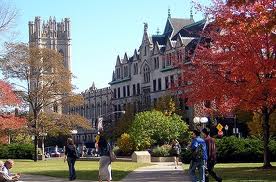Try smelling the crisp scent of the freshly snipped grass. Try imagining the aged tree, wound over itself numerous times. The crimson brick buildings, sprawled out across the luscious lawn. It is not a park. It is not a garden. It is none other than a college campus. And right in the middle of the lawn sits a massive roller coaster, corked with numerous turns and twists along the track. Is it hard to see? Look closer.
It is embedded in every student that vivaciously strolls across the sidewalks. It is embedded in those graduates, who look back upon their school with pride. It is embedded in those buildings, which house and nurture their students as they poke through the soil, breaking through to a new world.
All of those students…they have all ridden those rails. And even though so many have stepped foot on this coaster, handing in their own ticket to the operator, not a single one of these experiences, or tickets, is identical.
It would be a mistake, says Mr. Blackwell, one of the college counselors at Jesuit, “to frame it into a one size fits all emotional process, because it affects everybody a little bit differently.” The long process of college admissions, according to Mr. Blackwell, can be subdivided into four main steps: exploration, application, admission, and introspection.
Although the college process does not officially start until the second semester of Junior year, when members of the junior class gather for the famed College Kick-off Night in the Terry Center, it has already impacted even our youngest brothers at Jesuit, the freshman class, the Class of 2016.
“We introduce the college process starting the second semester of freshman year to say that grades are important, let’s focus on your grades, and keep that message and mindset in your mind,” says Blackwell.
Once the coaster reaches its full velocity during Junior year, once the student has been officially marked on the mailing list of every single college in the nation, the process really speeds up. Students begin to probe around, cautiously weeding through a few of the letters that they may receive bombarding them with information about college. Doing so, many find, can be quite overwhelming.
High school students, by definition, are new to the process. It is not something they have ever attempted before. Many complex factors are involved: questioning whether he will be admitted, pressure from parents, financial cost, and fear of assimilation into the school, to name a few.
Initially, it is most important “to be open,” because what might be the best fit for one student could be completely different for another. Students might jot down a few important characteristics of their ideal school, such as the ideal size or the ideal location. This is seen in an initial “Top Ten” list created during a one on one meeting with Mr. McDaniel, junior counselor, in which he and the student select ten schools that might be of interest.
Students, through their college counselors, have a great deal of resources and guidance available to them, if they so chose to take advantage of it. But even this mountain of aid cannot completely stop the roller coaster, or the emotions that the student feels through the ride.
Many times students themselves are the problem. “Every student wants to feel that his decision to come to Jesuit has value and merit,” says Blackwell, but unfortunately, students often link this worth with the letter that they receive during the spring, whether they have been accepted or not. It is a misleading slope. “[Jesuit doesn’t] pride [itself] on where you get accepted, so why would you?” explained Blackwell.

The Ivy-League applicant, who attempts to beat the odds by gaining admission to highly selective schools, many of which have acceptance rates below twenty percent, might feel a heightened pressure. “We’re sort of in a paradox right now in that the students feel the need to apply to many colleges, thereby further decreasing their acceptance rates.”
Many times parents are the problem. Like the student, who might sometimes overly trust his peers when making this highly personal decision, parents tend to base the majority of their information off conversations with their colleagues or friends. In their social circles, they compare other students with theirs, and as a result, demand that their student attend a higher-ranked school to satisfy their own wants. The reality is that, even though rankings from U.S. News and World Report or from The Princeton Review are sometimes useful, they should not be used as the guiding factor.
Sometimes, even cost is the problem.
“Cost becomes a factor that we cannot ignore,” says Blackwell. College tuition in this country has been on a steady upward incline for years; at many schools, the sticker-price for the student can be double what the parent might have paid years ago. However, there are numerous ways to reduce this advertised price, such as scholarships and financial aid, and at a school with “a man who has been here for 43 years and someone who has worked in college admissions” at the helm of the college counseling department, students have a wealth of knowledge leading their ride at the front of the car.
Choosing a college can certainly be quite overwhelming, but while the choice a student makes is important, a choice that can invoke a sea of self-doubt and self-questioning, “Getting into college is the goal.” Succeeding in college is the goal, a task that Jesuit students as a whole are well prepared to do.
“Jesuit students feel that they have come from a place of belonging and that they have the ability” to succeed academically in college and make an impact on the school that they choose, claimed Blackwell.
Jesuit has cultivated the student. Jesuit has watered the student. Jesuit has nourished the student. Like the rollercoaster, the student is therefore able to come full-circle and, in time, impact his world.






